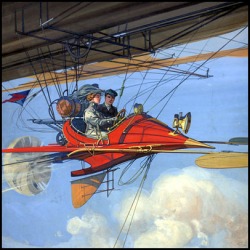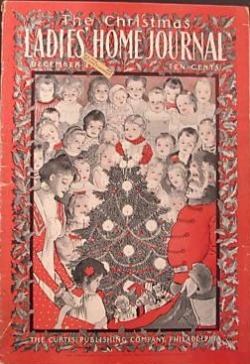
This sort of thing always makes my brain hurt.
If you've ever read any "alternative history" science fiction, like some of the stuff by Robert Heinlein or Harry Turtledove, you know what I mean. We generally walk around with a pretty good idea of how history has played out and without really thinking about it too much, we adopt a sort of historical chauvinism - "Well, of COURSE it worked out like that! What sort of stupid world do you think we live in that wouldn't turn out like that?"
Then you read something that points out that our world could have turned out very, VERY different, with just a few twists and turns, and it really messes with your head.

What the Lady's Home Journal did in December of 1900 was something like that, but about thirty or forty years before anyone else thought to do it. They asked leading experts and scientists to give their best guesses as to what the situation would be like in their fields of study in a hundred years' time.
The predictions were pretty amazing, both because of what they got right and what they got spectacularly wrong.
- Color Photography? - Check
- Intantanious beaming of information from around the world? - Check
- Peas the size of softballs? - Not So Much
- Giant Navies of zeppelins armed with doomsday devices? - 50/50
This is sort of like that. What they thought would happen was an extension of what they saw happening around them at the time.
What I did About all This:
Here's what I came up with:
| predictions_of_the_year_2000.doc |
I broke down the 29 big, multi-part predictions into 77 smaller, individual predictions. I rewrote the language to make it a little easier for 21st Century 8th Graders to understand. I printed them up on slips of paper and put them in the Awesome Jar of Destiny. (Da, da, DAAAAAHHH!!!)
After setting up the concept and reading some of the predictions to my students, I had each of them draw a prediction from the AJofD. Each of them was responsible for making a poster telling what their prediction was and whether it had come true or not. If it had, they were supposed to give evidence of how it had happened. If (and more interestingly), it had not, they were supposed to show that it hadn't and to tell what we can learn about how people in 1900 saw the world that made them make that kind of guess.
This was their first big project of the year.
Did it Work? Was it all Rainbows and Unicorns?
It turns out that this "alternate history" concept is pretty hard for 13 year-olds to wrap their heads around. I used a short homework assignment to help them with the idea of making predictions and wondering about the future, but some of my students were solidly concrete-operational at that point in the year and still had a hard time understanding what I was looking for. I'd probably have a little more luck assigning this project at the end of the year, when they've gone through their Amazing 8th Grade Cognitive Development Growth Spurt, but the end of the year is pretty packed already.
On the other hand, one of my goals is to challenge my advanced and gifted students more and this really grabbed some of their interests.
I think we'll do this project again this fall, with a little more scaffolding and maybe as a podcast; students could interview each other about their predictions and findings.
Or maybe as a VoiceThread...
Hmmmm...
 RSS Feed
RSS Feed